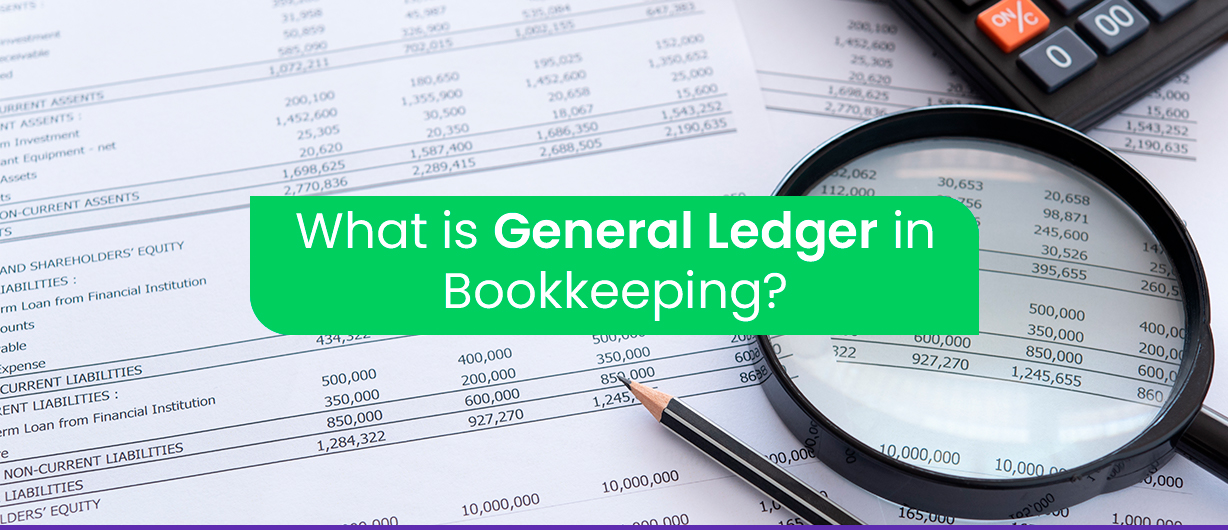August 5 2022 | By Wajiha Danish | 4 minutes Read

Variables are part and parcel of every business, and successful business owners know how to manage these variables like a pro. From managing staff to maintaining bookkeeping ledgers, business owners must oversee a hundred things to ensure their business doesn’t go belly up.
Safe to say, managing cash flow tops the list of essential things to do as it directly affects the financial health of your business. Remember, you have to incur an expense to get profits, and every business owner must keep track of the two to ensure they stay in control. How? Through bookkeeping.
As it goes, maintaining accurate financial records depicts the odds of success and failure of your business. Moreover, to keep perfect books, you must know what a general ledger in bookkeeping is.
A general ledger is one book with all the details of every financial transaction your business make; a master record. Every time the money changes hands, it goes into the bookkeeping ledger. It also contains the accounts chart, which includes all the different account details. These charts help you not merely understand how much you spent but see where exactly the money goes.
If you do double-entry bookkeeping in which you have to make two entries for every transaction, you would probably know all about general ledgers. Here, you do not merely have to maintain a single column but simultaneously feed data into two subsidiaries. The double-entry requires double the work for every sale or purchase you make, be it a credit or debit. However, it is worth the effort as it helps you earn compliance with regulatory bodies and achieve better financial clarity.
Every time you enter a sum in the ledger, be it credit or debit, you have made a journal entry. As every entry shows up in both the debit and credit subsidiaries, it gets easy to balance the books and perform weekly, monthly, and quarterly reconciliations – That’s why double-entry bookkeeping is a norm in the corporate world.
Given the importance of general ledgers, businesses used to document these physically. However, the winds of change have made everything digital, and the records now exist in the cloud or accounting software linked to the cloud.
A general ledger for bookkeeping is as crucial as a hotel master key. At the time of need, you can go directly to the room or section where the problem exists. In a super-busy life of an entrepreneur, it is pivotal to have all financial records in one place, and that place is a general ledger.
Businesses that maintain a bookkeeping ledger can check their financial health at a glance, while others have to spend days doing so. The delay ultimately affects their growth planning, ascension, strategies, and success. Without a general ledger, you can only make half-hearted decisions at best, as you don’t know where your finances stand.
Moreover, a bookkeeping ledger makes financial reporting simple. Having all the viable financial records in front, you can better report your financial health and assess your business position. A simple and up-to-date general ledger inspires a ripple effect, making your income and financial statements super-easy to read.
In summary, a general ledger helps you run your business stress-free. Not to forget, it makes tax preparation a breeze. Those who know how tough it gets to file returns with messy finances can vouch for sure the need for keeping an up-to-date general ledger. Without it, you would have to do double the work in the tax season and may even have to overpay.
Lastly, a bookkeeping ledger also helps you keep the investors happy. You can show up-to-date reports to investors whenever they need them without the need to put in the extra hours.
See Also: How To Create A Simple Bookkeeping Spreadsheet For Your Business?
Some people use general ledgers and balance sheets interchangeably. In reality, the two are not the same. The difference lies in scope or period. A bookkeeping ledger shows the financial record of the business’s entire life span. In contrast, a balance sheet only shows the records for a specific time or month. The first shows the complete financial health of your business, while the second depicts current performance.
No matter how important, maintaining a bookkeeping ledger is a dreary chore to do on repeat. It is hard to focus on business progression when you spend most days balancing the books. Thus, it is best to delegate bookkeeping to Monily and focus more on managing your business. You cannot wave a magic wand and make financial management less time-consuming, but you can hire us to take it off your shoulders.
Subscribe for business tips, tax updates, financial fundamentals and more.
MORE BLOGS

In the world of small businesses, managing finances can quickly become overwhelming. Enter the bookkeeper – a financial wizard who keeps your accounts in order, ensuring […]
Learn More →
In today’s digital world, small businesses are in for a tough time when it comes to managing their finances. Traditional bookkeeping methods are a real drag […]
Learn More →
The emergence of AI has impacted a number of sectors, including bookkeeping. AI bookkeeping solutions have been growing in popularity among small firms in recent years […]
Learn More →